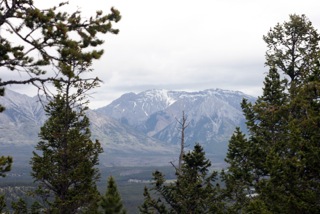My Experience at the Agricultural History Conference
26 June 2013 - 11:48am
 For the first time in its ninety-four year history, the Agricultural History Society (henceforth AHS) held its annual meeting in Canada, choosing Banff, Alberta as its venue. While the AHS has traditionally maintained a strong international audience, this year’s meeting was particularly diverse, with scholars from the Netherlands, New Zealand, England, Canada, and the United States in attendance.The level of Canadian participation was unprecedented, making this an extremely useful conference for those studying Canadian topics.
For the first time in its ninety-four year history, the Agricultural History Society (henceforth AHS) held its annual meeting in Canada, choosing Banff, Alberta as its venue. While the AHS has traditionally maintained a strong international audience, this year’s meeting was particularly diverse, with scholars from the Netherlands, New Zealand, England, Canada, and the United States in attendance.The level of Canadian participation was unprecedented, making this an extremely useful conference for those studying Canadian topics.
One of the most valuable aspects of this conference was the opportunity it provided scholars to share their work within a group devoted specifically to rural history. Canadian historians studying the countryside have benefited from several decades of research on this topic, but recent scholarship has advocated ‘the rural’ as a distinct category of analysis.Discussing emerging projects, ideas, and works within a specifically rural framework and amongst those who are currently defining the shape of future rural scholarship is an infrequent event, so participating in this conference was valuable and motivational. Adding to the usefulness of these discussions was the overall approachability of all attendees. Many first time participants noted how friendly and congenial other members were, which heightened the overall quality of discussion after each presentation and also allowed for plenty of networking opportunities.
The quality of scholarship was excellent. There were several of insightful papers on rural women, representations of the countryside, understandings of land use, and the intersections between science and agriculture. Of particular relevance were the questions relating to how Canadian historians and educators should approach rural Canadian history. New research has shown that Canada’s history is a rural history, but it is seldom taught as such. This conference highlighted the need to seriously consider Canada’s rural past in all levels of instruction.
Banff’s scenery made this conference special. The AHS encourages its members to engage with the landscape as much as possible while attending its annual meeting, even scheduling time for outdoor activities and pre-arranged field trips in its program. In so doing, conference attendees are able to learn about a variety of landscapes through direct interaction. I hiked up Tunnel Mountain with several other conference participants to enjoy the scenery, but other attendees traveled to Lake Louise, toured the town, or visited the nearby hot springs. Many, including myself, had not previously traveled to Banff, so having the opportunity to see its landscape while also attending such a fantastic conference was a unique experience.
As the primary organizers of this conference, Joe Anderson and Barbara Hahn deserve many thanks for their hard work and dedication. I sincerely hope that this year’s meeting will increase future Canadian participation within this historical society.
How do you deal with agricultural history in your classroom/museum lessons?
Photo: View from Tunnel Mountain, author's photo.

